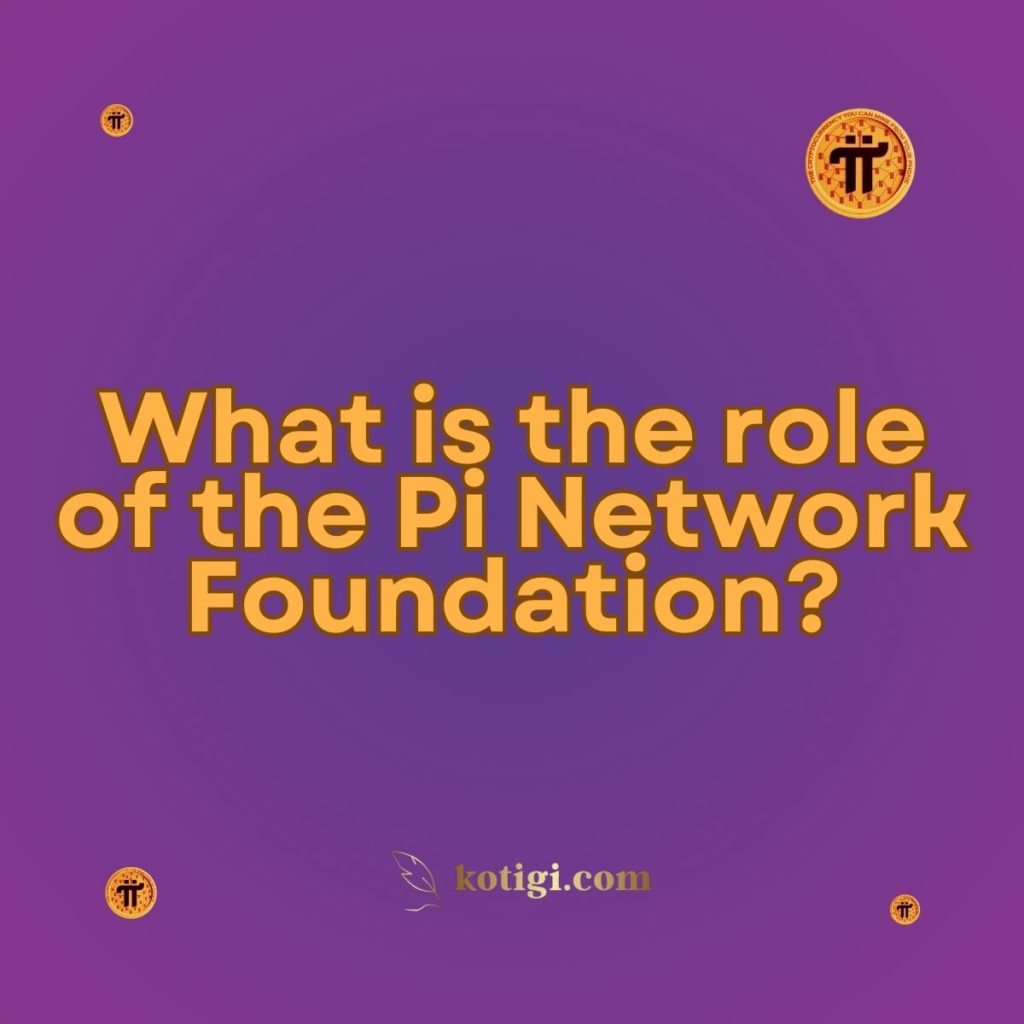
What is the role of the Pi Network Foundation?
The Pi Network Foundation is essential for the growth and governance of the Pi Network ecosystem. By enhancing community engagement, ensuring regulatory compliance, promoting education, and driving technological advancements, the foundation aims to create a sustainable and inclusive environment for all Pi Network users.
Introduction
As the cryptocurrency landscape matures, the necessity for organized governance and community support structures becomes increasingly evident. The Pi Network Foundation serves as a pivotal player in this context, providing the necessary infrastructure and oversight to ensure the long-term success of the Pi Network. Established alongside the cryptocurrency, the foundation’s mission is to promote decentralization, user empowerment, and community engagement.
In this post, we will delve deeply into the multifaceted role of the Pi Network Foundation, exploring its responsibilities, initiatives, and overall impact on the broader cryptocurrency ecosystem. Understanding the foundation’s functions can help users appreciate its contribution to the Pi Network’s overarching vision and the future of decentralized finance.
1. Overview of the Pi Network Foundation
1.1 What is the Pi Network Foundation?
The Pi Network Foundation is a non-profit organization created to support the development, governance, and sustainability of the Pi Network. It aims to foster a community-driven approach to cryptocurrency, empowering users to engage in decision-making processes and fostering collaboration among stakeholders.
Founded by a group of Stanford graduates in 2019, the Pi Network’s mission is to make cryptocurrency accessible to everyone, particularly those who have been excluded from traditional financial systems. The foundation is integral to this mission, serving as the backbone for initiatives that support user engagement and development.
1.2 Mission and Vision
The foundation’s mission is to create a secure, safe, and inclusive environment for Pi Network users. It envisions a world where everyone can participate in the cryptocurrency ecosystem without facing barriers typically associated with mining and trading, such as high costs or technical complexity.
This vision aligns with the broader goals of promoting financial inclusion and democratizing access to technology. The foundation seeks to empower individuals to take control of their financial futures, paving the way for a more equitable global economy.
1.3 Governance Structure
The governance structure of the Pi Network Foundation emphasizes transparency and community involvement. The foundation comprises a team of experts from various fields, including blockchain technology, law, economics, and community management.
Decisions within the foundation are often made with community input. Regular feedback loops allow users to express their opinions, ensuring that the foundation remains responsive to the needs of its constituents. This participatory governance model not only enhances accountability but also builds trust within the community.
2. Promoting Community Engagement
2.1 Building a Strong User Community
One of the primary roles of the Pi Network Foundation is to cultivate a vibrant and engaged user community. The foundation facilitates communication and collaboration among users, fostering a sense of belonging and shared purpose.
The Pi Network has successfully amassed millions of users across the globe, making it one of the largest cryptocurrency communities. The foundation aims to sustain this momentum by implementing initiatives that encourage active participation.
2.2 Organizing Community Events
The foundation organizes various events and initiatives to engage users, including webinars, workshops, and community meetups. These events provide opportunities for users to learn more about the Pi Network, share their experiences, and connect with other members.
For instance, the Pi Network Foundation hosts annual conferences that feature keynote speakers from the blockchain industry, panel discussions, and networking opportunities. These events not only enhance user knowledge but also foster a collaborative environment where users can share insights and ideas.
2.3 Facilitating User Feedback
User feedback is vital for the continuous improvement of the Pi Network ecosystem. The foundation actively seeks input from users on various aspects of the network, allowing them to voice their opinions and contribute to decision-making processes.
Surveys, polls, and community forums are commonly used to gather user insights. This feedback helps the foundation prioritize initiatives, identify areas for improvement, and make informed decisions that resonate with the community.
2.4 Leveraging Social Media
The foundation also utilizes social media platforms to foster community engagement. By sharing updates, news, and educational content, the foundation keeps users informed and involved in ongoing discussions. Platforms like Twitter, Telegram, and Discord serve as channels for real-time interaction, allowing users to connect with one another and the foundation team.
3. Ensuring Regulatory Compliance
3.1 Navigating Legal Frameworks
As cryptocurrencies face increasing regulatory scrutiny worldwide, the Pi Network Foundation plays a crucial role in ensuring that the network complies with applicable laws and regulations. This involves staying informed about changes in legislation and adapting the network’s operations accordingly.
The foundation engages with legal experts to interpret relevant regulations and develop strategies to align the network with legal requirements. This proactive approach minimizes potential legal risks and establishes the foundation as a responsible entity in the cryptocurrency space.
3.2 Engaging with Regulatory Bodies
The foundation engages with regulatory bodies to advocate for fair and reasonable regulations that support the growth of the cryptocurrency ecosystem. By participating in discussions with policymakers, the foundation aims to promote a balanced approach to cryptocurrency regulation.
This engagement includes collaborating with industry associations and coalitions to collectively address regulatory challenges. By presenting a unified voice, the foundation helps ensure that the interests of the Pi Network community are represented in regulatory discussions.
3.3 Educating Users on Compliance
To help users understand their responsibilities within the network, the foundation provides educational resources on compliance issues. This includes information on tax obligations, security practices, and legal considerations for cryptocurrency users.
Regular webinars and informational articles are published to clarify compliance-related topics, enabling users to navigate the complexities of cryptocurrency regulations confidently.
4. Supporting Technological Development
4.1 Funding Research and Development
The Pi Network Foundation allocates resources to support research and development initiatives that enhance the functionality and security of the Pi Network. By investing in technological advancements, the foundation aims to keep the network competitive and innovative.
This includes funding projects that explore new blockchain technologies, enhance user experience, and improve transaction efficiency. By staying at the forefront of technological developments, the foundation ensures that the Pi Network can adapt to changing market conditions.
4.2 Collaborating with Developers
The foundation collaborates with developers and tech experts to create new features and improve existing ones. This partnership ensures that the network evolves in line with user needs and industry trends.
Through hackathons and developer conferences, the foundation encourages innovative thinking and problem-solving. By inviting developers from around the world to contribute to the Pi Network’s codebase, the foundation fosters a culture of collaboration and knowledge sharing.
4.3 Promoting Open Source Contributions
Encouraging open source contributions is a key aspect of the foundation’s strategy. By inviting developers from around the world to contribute to the Pi Network’s codebase, the foundation fosters innovation and diversity in development.
Open source projects benefit from collective knowledge and expertise, leading to more robust and secure solutions. The foundation maintains a transparent approach, allowing anyone to participate and contribute to the network’s growth.
5. Educating the Community
5.1 Providing Educational Resources
Education is a cornerstone of the Pi Network Foundation’s mission. The foundation develops and disseminates educational materials to help users understand cryptocurrency, blockchain technology, and the Pi Network itself.
These resources include tutorials, guides, and articles designed for users at various levels of experience. The foundation recognizes that education is essential for empowering users to navigate the complexities of the cryptocurrency world effectively.
5.2 Hosting Workshops and Seminars
The foundation organizes workshops and seminars to provide hands-on learning experiences for users. These events cover various topics, including cryptocurrency basics, security practices, and potential applications of blockchain technology.
Interactive sessions allow participants to engage with experts, ask questions, and gain practical knowledge. By promoting a culture of learning, the foundation enhances users’ confidence and competence in using the Pi Network.
5.3 Creating a Knowledge Hub
To centralize information, the foundation maintains an online knowledge hub where users can access educational resources, FAQs, and tutorials. This hub serves as a valuable reference point for both new and experienced users.
The knowledge hub is regularly updated to reflect the latest developments and trends in the cryptocurrency space. By providing easy access to reliable information, the foundation supports users in their educational journeys.
6. Promoting Inclusivity
6.1 Expanding Access to Cryptocurrency
The Pi Network Foundation is committed to expanding access to cryptocurrency for underserved populations. By removing barriers to entry, such as high hardware costs and complex mining processes, the foundation aims to empower individuals from diverse backgrounds.
Through initiatives that focus on mobile mining, the foundation allows users to participate in the network using devices they already own. This approach democratizes access to cryptocurrency, enabling broader participation.
6.2 Supporting Underrepresented Communities
The foundation actively seeks to support underrepresented communities in the cryptocurrency space. This includes initiatives aimed at educating and empowering women, minorities, and individuals in developing regions.
Targeted programs provide resources, mentorship, and support tailored to the unique challenges faced by these communities. By fostering inclusivity, the foundation enhances the diversity of voices and perspectives within the Pi Network.
6.3 Encouraging Diversity in Participation
Encouraging diversity in participation is essential for the foundation. By fostering an inclusive environment, the foundation enhances creativity and innovation within the Pi Network ecosystem.
The foundation promotes diverse leadership within its initiatives, ensuring that decision-making processes reflect a variety of experiences and viewpoints. This commitment to inclusivity strengthens the foundation’s ability to serve its community effectively.
7. Collaborating with Other Organizations
7.1 Building Partnerships
The Pi Network Foundation recognizes the importance of collaboration and builds partnerships with other organizations in the blockchain and cryptocurrency sectors. These partnerships can lead to knowledge sharing, resource pooling, and innovative initiatives.
Collaborating with established industry players allows the foundation to leverage expertise and resources, enhancing its impact on the ecosystem. Joint initiatives can address common challenges and promote mutual growth.
7.2 Engaging with Academia
The foundation collaborates with academic institutions to promote research and education in blockchain technology. By partnering with universities, the foundation can support cutting-edge research and contribute to the development of the field.
Academic partnerships also facilitate internship programs, allowing students to gain practical experience while contributing to real-world projects. This symbiotic relationship benefits both students and the foundation, fostering innovation and learning.
7.3 Participating in Industry Events
Active participation in industry events, conferences, and seminars allows the foundation to showcase the Pi Network and connect with other players in the cryptocurrency ecosystem. These interactions foster collaboration and drive awareness of the project.
By sharing insights and experiences at industry events, the foundation enhances its visibility and credibility within the cryptocurrency community. This engagement opens doors to new partnerships and opportunities for growth.
8. Monitoring and Evaluation
8.1 Assessing Impact
The Pi Network Foundation regularly assesses the impact of its initiatives to ensure they align with the organization’s mission and goals. By evaluating the effectiveness of programs and projects, the foundation can make informed decisions about future directions.
Data-driven assessments provide insights into user engagement, educational outcomes, and community satisfaction. This continuous evaluation process allows the foundation to identify strengths and areas for improvement.
8.2 Gathering Data and Feedback
Data collection and user feedback are essential for monitoring the success of the foundation’s initiatives. By analyzing data and soliciting input from users, the foundation can identify areas for improvement and adapt its strategies accordingly.
Regular surveys, focus groups, and feedback mechanisms ensure that user perspectives are integrated into decision-making processes. This commitment to listening to the community enhances transparency and accountability.
8.3 Reporting Outcomes
The foundation publishes regular reports detailing its activities, outcomes, and future plans. These reports provide transparency to the community, showcasing the foundation’s achievements and ongoing efforts.
By sharing results and lessons learned, the foundation fosters trust and encourages user involvement in shaping future initiatives. This transparency reinforces the foundation’s commitment to accountability.
9. Future Directions
9.1 Adapting to Industry Changes
The cryptocurrency landscape is rapidly evolving, and the Pi Network Foundation must remain agile and adaptable to stay relevant. This involves keeping abreast of technological advancements, regulatory changes, and user needs.
The foundation actively monitors industry trends and emerging technologies, positioning itself to respond effectively to shifts in the market. By remaining proactive, the foundation ensures that the Pi Network can thrive in a dynamic environment.
9.2 Expanding Global Reach
To fulfill its mission of inclusivity, the foundation aims to expand its global reach. This includes establishing local chapters or partnerships in different regions to better serve diverse communities.
By tailoring initiatives to local contexts, the foundation can address specific challenges faced by different populations. This localized approach enhances the effectiveness of programs and fosters community engagement.
9.3 Innovating Governance Models
The foundation is continually exploring innovative governance models to enhance user participation and decision-making. By involving users in governance processes, the foundation can strengthen community engagement and ownership.
This exploration includes experimenting with decentralized governance structures that empower users to have a direct say in the network’s development. By embracing innovation in governance, the foundation can adapt to the evolving needs of its community.
Conclusion:
The Pi Network Foundation plays a vital role in the growth and sustainability of the Pi Network ecosystem. By promoting community engagement, ensuring regulatory compliance, supporting technological development, and fostering inclusivity, the foundation lays the groundwork for a robust and thriving cryptocurrency network.
As the cryptocurrency landscape continues to evolve, the foundation’s commitment to transparency, education, and collaboration will be essential for the long-term success of the Pi Network. By empowering users and fostering a sense of community, the foundation aims to realize its vision of a decentralized and inclusive future for cryptocurrency.
Key Takeaways:
- The Pi Network Foundation is a non-profit organization dedicated to supporting the Pi Network and its users.
- Its mission includes promoting community engagement, ensuring regulatory compliance, and driving technological advancements.
- The foundation organizes events, provides educational resources, and facilitates user feedback to strengthen the community.
- It navigates regulatory challenges to ensure compliance and advocates for fair regulations in the cryptocurrency space.
- Collaborations with other organizations and academic institutions enhance the foundation’s impact and reach.
- Monitoring and evaluation of initiatives ensure transparency and accountability within the community.
- The foundation aims to adapt to industry changes, expand globally, and innovate governance models for user participation.





